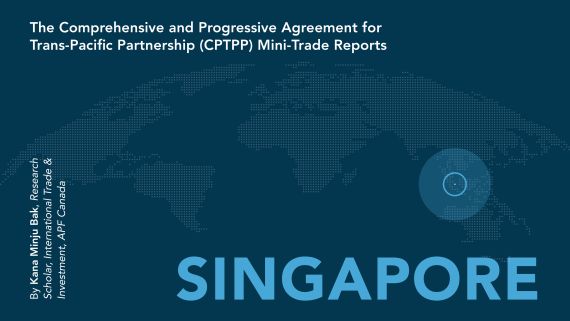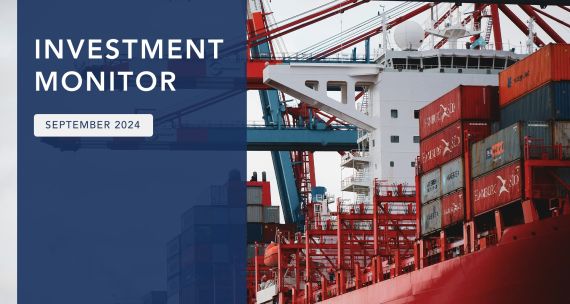The conversation around state-owned enterprises (SOEs) captures media attention in Canada. Most recently, the Chinese ambassador to Canada was quoted in a major Canadian daily calling it "immoral" for Canadians to oppose takeovers of their companies by Chinese government-controlled businesses, and further decrying national security scrutiny of these acquisitions. 'Immoral' is a strong word, and certainly not one that, as a former diplomat, I would use to encourage an accepting attitude toward a position one is trying to promote.
It is clear from Asia Pacific Foundation of Canada (APF Canada) national opinion polls that Canadians are concerned about investment from China in general (only 42 per cent support it), but SOE investment in our resource sector in particular (only 11 per cent support). Concern about resource investment is not restricted to China — it extends to the United States as well. APF Canada polling suggests that Canadians worry that investment from global powers like China and the U.S. will lead to a loss of control over our natural resources. Where almost half (48 per cent) of Canadians associate Chinese investment with this "loss of control," 42 per cent associate the same phrase with investment from the U.S. It would make sense, then, for the Chinese ambassador to moderate his language, acknowledge Canadian concerns, differentiate between sectors, and focus on those that are less sensitive and also provide maximum net benefit for Canada.
A case in point is the purchase of Aecon. This purchase, again, has received media scrutiny — some positive, but most negative. Yes, the Chinese Communications Construction Company (CCCC) is an SOE, but it has made an offer to buy a Canadian construction firm, not a resource company. CCCC has a history of acquiring companies in markets outside of China and it has a recognized record of adding net benefit to the economies in which it makes those investments.
Joe Barr, the CEO of John Holland, an Australian construction firm very similar to Aecon and acquired by CCCC in 2015, said in a December op-ed that ran in Canada that since the acquisition, "Our revenues have gone from $2.7 billion at the time of our acquisition and increased by almost $1 billion this year, and we're on track to double the size of our business (from 2015 levels) by 2020. In fact, we're hiring 100 new employees — 100 Australians — every month and will be for the next 15 months." He also made the point that CCCC's ownership provides access to capital and international projects, most notably in Asian countries.
The Aecon acquisition is now going through a National Security Review process. Not all foreign SOEs or private sector companies should be given carte blanche, and Canada is right to be cautious in sensitive areas such as artificial intelligence, cybersecurity, big data, and privacy. But my belief is that neither media posturing, nor fear mongering should be a consideration in the process. And level playing fields should be expected, on both sides of the Pacific.
Canadian Crown corporation pension plans can be classified as SOEs (i.e. legal entities created by government to engage in commercial activities on the government's behalf) and they have not been immune to the review process. In fact, in 2007 the Canadian Pension Plan Investment Board (CPPIB) submitted a bid for a 40 per cent stake in the Auckland International Airport, New Zealand's largest airport. The deal, value at C$1.4 billion, was turned down the following year by the New Zealand government, which ruled CPPIB's application didn't meet thresholds set out under the Overseas Investment Act, including demonstrable technological benefits and the ability to create jobs.
Why is Canadian outbound investment to Asia important? APF Canada has produced, in partnership with the Bank of Canada, Economic Development Canada, and The School of Public Policy at the University of Calgary, an online resource called the Investment Monitor. It aggregates raw data from APF Canada's archive of investment deal announcements from 2003 to present to provide reliable public information on the volume, scale, and scope of two-way foreign direct investment between Canada and the economies of the Asia Pacific.
Last year, our Investment Monitor research focused on Asian inbound investment to Canada. This year, our research is focused on Canadian outbound investment to Asia — and remarkable numbers have emerged. Our pension funds are recognized global investment leaders and they are fundamental to Canada's brand in Asia. In 2012, pension fund investment represented 10 per cent of Canadian investment in China; in 2017, it represented 20 per cent. The growth in pension plan investment in India is even more remarkable. In 2012, pension plan investment in India represented two per cent of Canadian investment in India; in 2017 it represented 24 per cent.
In the end, it is important how we handle SOE investment in Canada as investment for economic growth and development, either SOE or private investment, should be welcome. National security is paramount, but decisions should be based on facts and benefits, and not on emotion.
This piece first appeared in The Vancouver Sun on May 6, 2018



